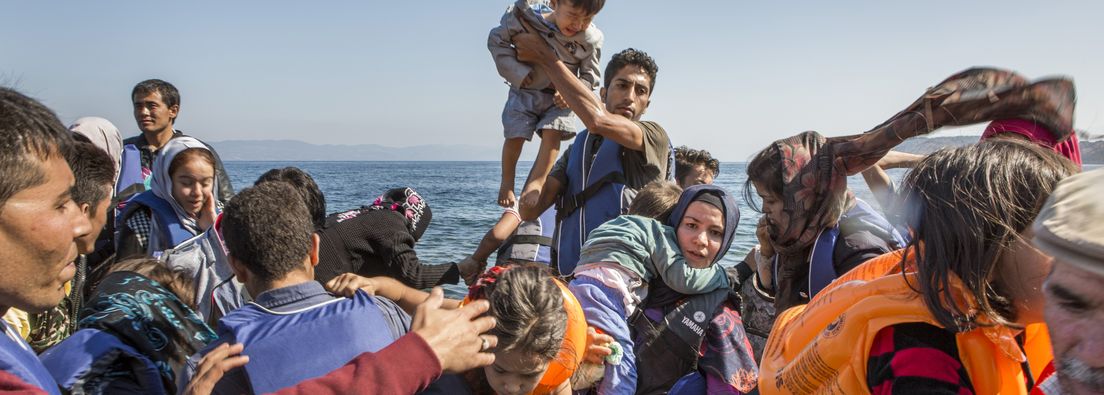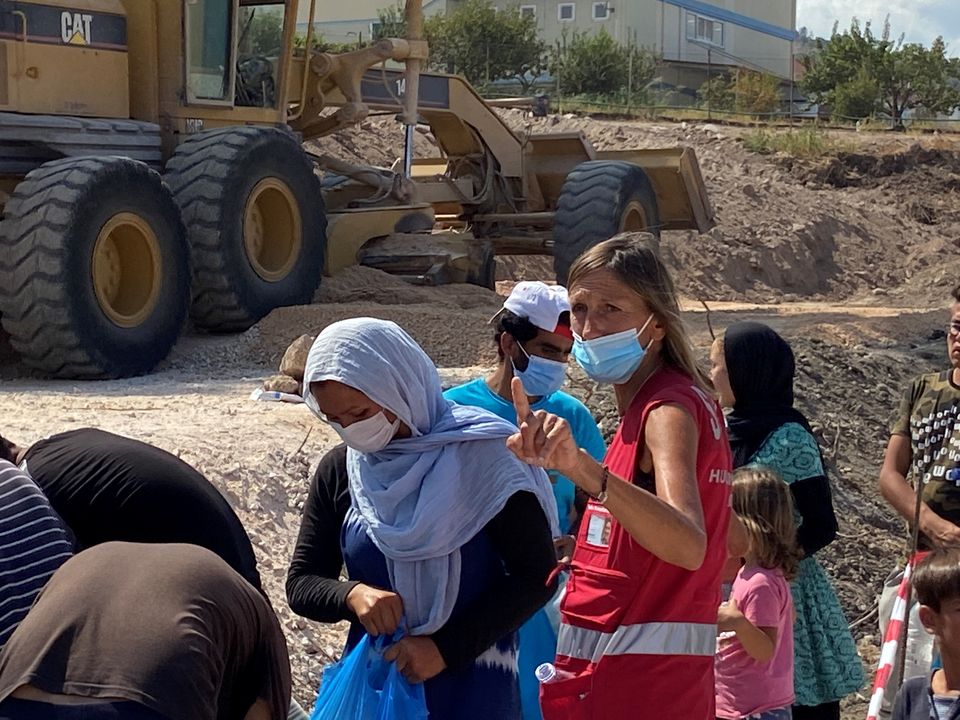Some 12,000 people were able to save only the bare essentials. In the space of a few hours, they found themselves out on the streets – with no shelter, no water and no food, having lost whatever they had managed to build for themselves over the last years or months. "I was fast asleep when the fire started," says Ehmad from Sudan. "When I woke up, I was already surrounded by flames. I was very scared because it reminded me of the fire in which I lost my wife and two children.
Ehmad had arrived on Lesbos the year before and was one of the first to move into the new camp after the fire in Moria. The camp, later named the New Lesbos Registration and Identification Centre, was still under construction. The Greek army had built it in a very short time on an old military training ground by the sea. Many refugees and migrants were still reluctant to move into the tents, fearing a 'second Moria', something Ehmad did not understand. "The situation on the streets is not good. I feel safer here and at least I have a tent to sleep in," says the 37-year-old as he puts his headphones back on. "Lucky I was able to save these," he says with a smile. "I listen to stories in English so I can improve my English and forget the misery here for a short time." Zeba from Afghanistan finds little comfort in the new camp. "I'm not doing at all well, I lost my baby two months ago and the bleeding just won't stop," says the 32-year-old, who blames her constant fear in Moria for her miscarriage. "I often lay awake at night because groups of men had formed in the camp who walked around in the dark carrying knives. I was terribly afraid, and I lost my baby because of it." Zeba and her husband, who arrived on Lesbos a year ago, were able to save virtually nothing from the fire. "Everything is burnt – everything! All my clothes are gone and I only have one pair of underwear, which is a big problem in my current state."
A few days after the fire in Moria, four tonnes of relief supplies arrived in Lesbos from Swiss Humanitarian Aid, the only governmental organisation on the ground. The supplies were flown to the island on a specially chartered plane, unloaded by the Greek army and transported to the camp. "Tomorrow evening, there'll be clean drinking water in the camp," said Patrick Kilchenmann, one of the four WASH experts sent to set up a drinking water supply in the new camp. The Swiss team faced major challenges, because at the time it was still unclear where the water for the reservoirs that had been delivered would come from. Our experts phoned around and finally found a supplier who would bring the required 30,000 litres of drinking water to the camp the next day. And at 5pm on 16 September, clean water was flowing from the taps, and hundreds of people came with their canisters, PET bottles, buckets and even wheelbarrows to supply their families with the urgently needed drinking water. It was a special moment for the people in the camp, who needed the water so desperately. "Because water is life," says Narges from Afghanistan.
Word quickly got around that there was drinking water in the camp's Blue-C sector, which led to a long queue and the inevitable chaos. A few members of the Swiss team and some volunteers from among the camp's inhabitants were soon busy directing the crowds around the taps and making sure that the water was distributed in an orderly fashion. "You can feel the potential for tension at the water points," says Jean-Luc Bernasconi, who headed the Swiss rapid response team in Moria.
The emergency relief operation on Lesbos lasted 20 days. Although some critics blamed Swiss Humanitarian Aid for creating a 'second Moria' with inhumane conditions, from a humanitarian perspective there was no alternative. Should we have looked the other way and refused to help? People had gone without enough drinking water for days. Emergency aid was absolutely essential. 34 degrees in the shade without enough water – it doesn’t bear thinking about.
The challenge now is to ensure that people continue to receive assistance. This includes supporting the local hospital, Vostanio, in the capital Mytilene, where Swiss Humanitarian Aid is supplying PPE and other equipment such as respirators to cope with the COVID-19 pandemic. The local hospital is completely overwhelmed. The island of Lesbos has a population of around 86,000, and is currently home to around 12,000 refugees, which is a third of the population of its capital Mytilene. Switzerland is working closely with the Greek authorities on the water supply and sanitation facilities, which need further improvement.
Humanitarian aid is limited in scope, and cannot solve political problems. Its first priority is to save lives and alleviate suffering. But people also need hope, because there are individual human lives behind the numbers you hear and read about in the media.
Text: Billi Bierling, member of the Swiss Humanitarian Aid Unit, October 2020



